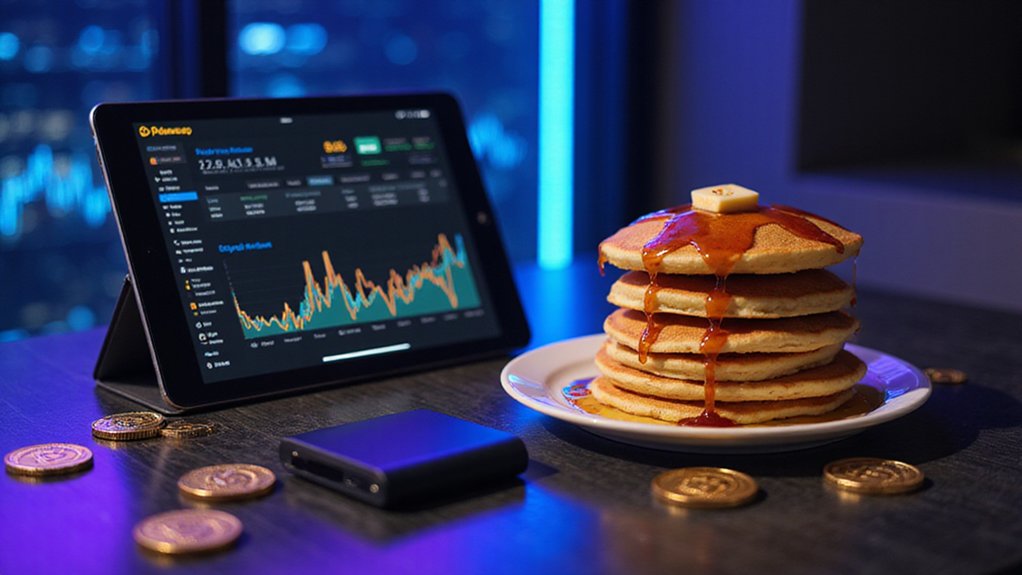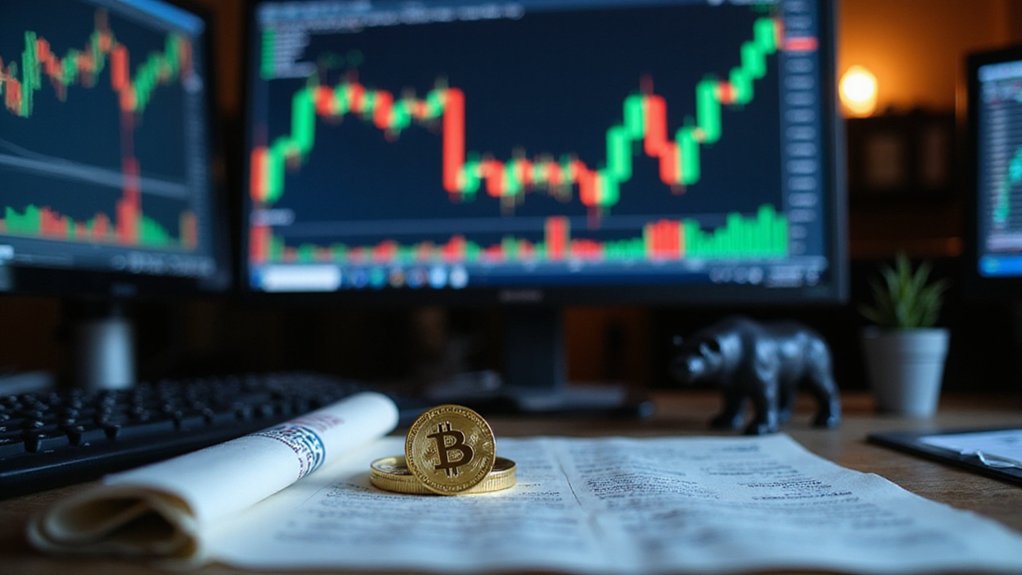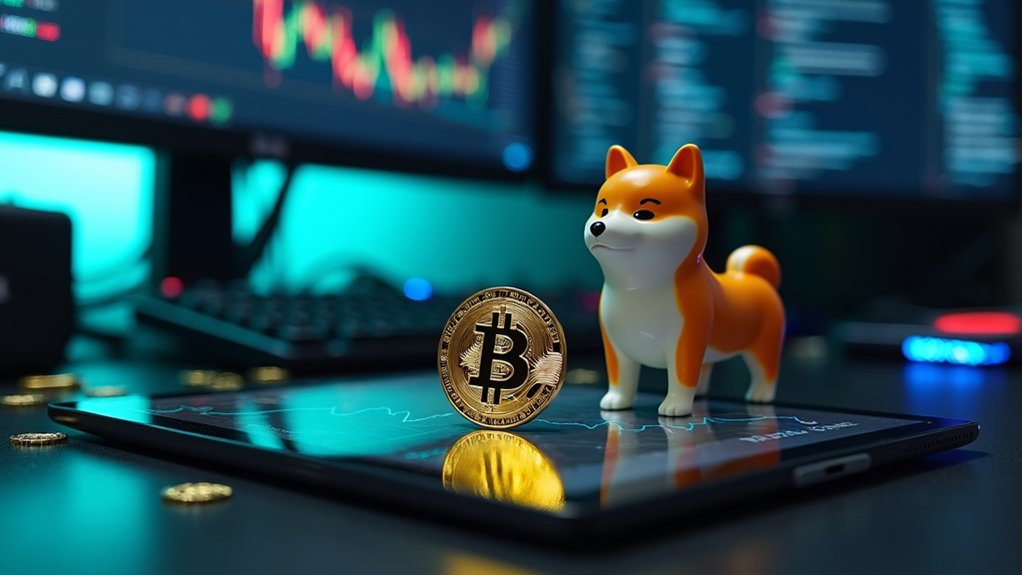PancakeSwap, launched in September 2020, revolutionized DeFi on Binance Smart Chain with its automated market maker model. The platform combines near-instant transactions with remarkably low fees (under $0.10 per swap)—a welcome departure from Ethereum’s notorious gas costs. Its ecosystem features CAKE token governance, yield farming, and even a surprisingly popular lottery system, all secured through multi-signature contracts and regular third-party audits. The platform’s non-custodial architecture guarantees users maintain control while exploring this peculiarly named financial ecosystem.

In the ever-evolving landscape of decentralized finance, PancakeSwap has emerged as a formidable player since its September 2020 launch, offering an extensive suite of financial tools that have fundamentally altered how users interact with digital assets on the Binance Smart Chain.
This automated market maker (AMM) has carved out a substantial niche in the DeFi ecosystem, boasting near-instant transaction confirmations and fees that make Ethereum maximalists wince—often below $0.10 per swap, a welcome departure from the eye-watering gas fees elsewhere.
Transaction speeds that Ethereum users dream about at fees that won’t liquidate your portfolio
The platform’s architecture extends beyond its BSC origins to encompass multiple networks including Ethereum, Polygon zkEVM, and Arbitrum One—an expansion strategy that has bolstered its position as a cross-chain liquidity hub.
PancakeSwap’s 0.25% trading fee structure (which drops to a mere 0.02% for makers in perpetual futures) has attracted millions of users seeking refuge from traditional finance’s opacity and inefficiency.
The CAKE token, meanwhile, serves as both governance mechanism and incentive structure, allowing holders to participate in platform decisions while earning rewards through staking.
Security-conscious users can take comfort in PancakeSwap’s commitment to transparency; its open-source codebase has weathered scrutiny from respected auditors including Certik and Peckshield.
The platform employs multi-signature contracts—a prudent safeguard in an industry where “move fast and break things” often means “lose everyone’s money irretrievably.”
Beyond simple token swaps, PancakeSwap offers yield farming, staking, and even ventures into NFT marketplaces and prediction markets.
Its non-custodial architecture guarantees users maintain control of their assets throughout transactions—a philosophical cornerstone of decentralized finance.
At its peak, the protocol locked billions in total value, cementing its status as BSC’s premier DeFi destination.
The platform’s lottery function draws impressive participation with up to 11,000 daily players competing for substantial prize pools in regular drawing rounds.
Many users access PancakeSwap through MetaMask wallet extension, which provides secure transaction capabilities and digital asset management across multiple blockchain networks.
For those exploring the occasionally bewildering world of decentralized finance, PancakeSwap represents something of a paradox: a mature, feature-rich platform that somehow maintains the accessibility necessary for mainstream adoption.
As blockchain technology continues its inexorable advance into financial systems, PancakeSwap’s influence on DeFi innovation shows no signs of waning.
Frequently Asked Questions
How Secure Is Pancakeswap Compared to Other DEXS?
PancakeSwap maintains comparable security standards to other major DEXs, with regular third-party audits and a bug bounty program providing foundational protection.
Its BSC-based infrastructure offers lower transaction costs—though this comes with different security considerations than Ethereum-based alternatives.
While not immune to incidents (having weathered phishing attacks and a DNS hack), PancakeSwap has demonstrated responsiveness to threats and implemented protective measures including anti-flash loan safeguards and smart contract protections that rival industry standards.
Can I Participate in Governance With Small CAKE Holdings?
Small CAKE holders face notable governance limitations in PancakeSwap’s ecosystem.
While direct voting power remains proportionally minimal (veCAKE being the prerequisite currency of influence), alternative avenues exist: community proposals, feedback forums, and supporting initiatives that eventually reach Core Team consideration.
Tokenomics 3.0 potentially offers salvation, promising to eliminate veCAKE mechanisms altogether.
Until then, modest stakeholders operate primarily as spectators—their collective voice relevant but individually diluted in the protocol’s decision-making apparatus.
What Happens if BSC Experiences Downtime?
When BSC experiences downtime, the entire network halts—transactions freeze, smart contracts pause, and DeFi platforms like PancakeSwap become temporarily inaccessible.
Users face stalled transactions, potential financial losses, and market volatility as traders scramble to adjust positions.
BSC’s centralized nature (a rather inconvenient truth for “decentralization” enthusiasts) means downtime affects all applications simultaneously.
During these periods, alternative block explorers like bsctrace.com may provide more accurate network status information than the often-lagging BscScan.
How Does Pancakeswap Handle Impermanent Loss?
PancakeSwap doesn’t directly “handle” impermanent loss—rather, it offers mechanisms to help offset it.
The platform incentivizes liquidity provision through CAKE rewards, trading fees, and yield farming opportunities that may compensate for potential losses.
For risk-averse users, PancakeSwap provides stablecoin pairs with reduced volatility and single-asset staking options.
While the platform’s tools help estimate impermanent loss, the fundamental AMM mathematics (that pesky x×y=k formula) remains unchanged—and with it, the inherent risk.
Are There Tax Implications When Earning CAKE Rewards?
CAKE rewards typically incur tax obligations as income based on their fair market value at receipt—a situation crypto enthusiasts might find irritatingly mundane in the otherwise boundary-pushing DeFi space.
Additionally, subsequent trades trigger capital gains considerations, creating a multi-layered tax scenario that demands meticulous record-keeping.
Tax authorities worldwide (predictably) view yield farming and staking rewards as taxable events, though specific treatment varies by jurisdiction—necessitating consultation with tax professionals familiar with cryptocurrency’s peculiar financial architecture.









